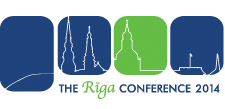SEPTEMBER 12, 2014
Rethinking the EU’s Approach to its Eastern Neighborhood
On September 12, 2014, the German Marshall Fund of the United States (GMF) held the fifth Riga Process Workshop, titled, “Rethinking the EU’s Approach to its Eastern Neighborhood.”
The Riga Summit in May 2015 will offer a timely opportunity to rethink and reformulate the European Union’s approach to the Eastern Partnership in light of recent developments stemming from the Ukraine crisis and the results of the NATO Summit in Wales in September 2014. The Riga Process Workshop, which is supported by the Ministry of Foreign Affairs of the Republic of Latvia and the Latvian Transatlantic Organization (LATO), has examined options for a new vision for the Eastern Neighborhood, taking into account recent geopolitical challenges in the region and ensuing events. While the signing of Association Agreements by Georgia, Moldova, and Ukraine in June 2014 can be heralded as positive achievements after the shortcomings of the Vilnius Summit in November 2013, the process of implementation, including political and economic stabilization, will not be without adversity. Participants have discussed strategies for the EU and the United States to address these challenges, as well as options for shaping of the future relationship with Russia in the aftermath of the annexation of Crimea and other recent developments which have added urgency to the need for the EU to define a coherent and mutually beneficial approach in dealing with Russia.
The Riga Process Workshop, which was held under the Chatham House Rule, brought together high-level experts, officials, and thought leaders to examine the EU’s strategy and ability to forge strong and reliable relationships with its Eastern neighbors and to encourage their transition towards democracy and free market economies.
The Riga Process is designed to explore long-term thinking about European foreign policy. The project was launched in September 2012 and consists of biannual workshops that bring together two dozen experts from governments, academia, think tanks, and the corporate sector from multiple European countries as well as some participants from the United States to describe, analyze, and draw up possible consequences from the strategic changes imposed by regional and global developments, especially for Europe’s hard and soft power, as well as for global and transatlantic relations.
As part of the Riga Process, GMF will work on proposals for a potential reorientation or redesign of EU policies in the EU’s Eastern neighborhood. Particular attention will be paid to the need and potential for transatlantic cooperation in this field. In 2014, the Program will convene two Riga Process workshops and release a culminating report.


